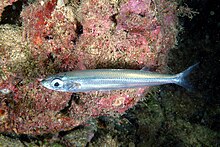| Old World silverside Temporal range:
| |
|---|---|

| |
| Atherina hepsetus | |
| Scientific classification | |
| Domain: | Eukaryota |
| Kingdom: | Animalia |
| Phylum: | Chordata |
| Class: | Actinopterygii |
| Order: | Atheriniformes |
| Suborder: | Atherinoidei |
| Family: | Atherinidae Risso, 1827 |
| Sub-families[2][3] | |
|
see text | |
The Old World silversides are a family, Atherinidae, of fish in the order Atheriniformes. Atherinidae are abundant and considered bony fish (teleost) that are widespread globally, living in rivers, estuaries, and coastal waters.[4] They occur worldwide in tropical and temperate waters. About two-thirds of the species are marine, and the remainder live in fresh water. The 74 species are in 13 genera. The genus Craterocephalus is the most diverse with 25 species. Four genera are monotypic.
Silversides are relatively small[1] with most being less than 20 cm (7.9 in) in length, with several not attaining lengths of more than 5 cm (2.0 in). The body is generally elongated. Distinctive characters include two dorsal fins widely separated, with the first consisting of flexible spines and the second having one spine followed by soft rays, while the anal fin has one spine on the leading edge followed by soft rays. The pectoral fins tend to be high, and there is no lateral line. On the flanks is a broad, silvery band. The scales are relatively large.
They feed on zooplankton. Some species, such as the hardyhead silverside, Atherinomorus lacunosus, are commercially fished.
The family Atherinopsidae (Neotropical silversides) is closely related, while the genus Atherion has been given family status in the Atherionidae by some authorities.[5]
- ^ a b Allen, G.R. (1998). Paxton, J.R.; Eschmeyer, W.N. (eds.). Encyclopedia of Fishes. San Diego: Academic Press. pp. 153–154. ISBN 0-12-547665-5.
- ^ Froese, Rainer; Pauly, Daniel (eds.). "Family Atherinidae". FishBase. February 2015 version.
- ^ Ivantsoff, I. & Allen, G.R. (2011). "A new species and genus of a large and unusual freshwater hardyhead, Sashatherina giganteus (Pisces: Atherinidae) from West Papua, Indonesia and a comparison with its closest relatives of the genus Craterocephalus". Aqua, International Journal of Ichthyology. 17 (1): 43–57.
- ^ Prince, J. D.; Potter, I. C. (1983). "Life-cycle duration, growth and spawning times of five species of atherinidae (Teleostei) found in a Western Australian estuary". Marine and Freshwater Research. 34 (2): 287–301. doi:10.1071/mf9830287. ISSN 1448-6059.
- ^ Cite error: The named reference
Nelson5was invoked but never defined (see the help page).